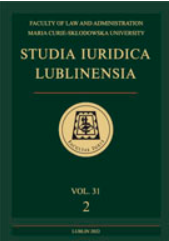Analyzing Legal Argumentation: What Theoretical Model Is the Most Comprehensive?
Analyzing Legal Argumentation: What Theoretical Model Is the Most Comprehensive?
Author(s): Tamara DudashSubject(s): Law, Constitution, Jurisprudence, Philosophy of Law, Sociology of Law
Published by: Wydawnictwo Naukowe Uniwersytetu Marii Curie-Sklodowskiej
Keywords: legal arguing; legal argumentation; theoretical model of legal argumentation; body of legal arguing; instruments of legal arguing; reconstruction and evaluation of legal argumentation
Summary/Abstract: Today, there is a clear need in developing a unified theoretical model of legal argumentation viable for all areas of legal practice and legal doctrine. Despite the existence of several models within either general argumentation theory or multiple judicial-reasoning doctrines, none of them can be used as a universal tool for studies of legal argumentation. The aim of this article is to suggest a theoretical model of legal argumentation viable for analysis of legal argumentation not only in judicial reasoning but also in other areas, e.g., law making, law application, or law interpretation. The subject matter of this article is a theoretical model of legal argumentation as a universal multidisciplinary theoretical basis for legal argumentation analysis. The theoretical model of legal argumentation encompasses an argumentative situation, a body of legal arguing, instruments of legal arguing and argumentation, a reconstruction and an evaluation of legal argumentation. In its turn, the body of legal arguing includes: parties of legal arguing, a subject of legal arguing, and a content of legal arguing. The instruments of legal arguing include legal and other arguments, argument schemes, argumentation structures, and rules of legal argumentation.
Journal: Studia Iuridica Lublinensia
- Issue Year: 31/2022
- Issue No: 3
- Page Range: 85-103
- Page Count: 19
- Language: English

